Gains and losses

Arthanarthanubandhasanshayavichara Prakarana

 ain is of three kinds: gain of wealth, religious merit and pleasure; similarly, loss is of three kinds: loss of wealth, religious merit and pleasure.
ain is of three kinds: gain of wealth, religious merit and pleasure; similarly, loss is of three kinds: loss of wealth, religious merit and pleasure.
Causes of Losses
Sometimes when gains are being sought, or expected to be realized, the efforts result in losses. The causes of are many and varied: weakness of intellect, simplicity, excessive love, pride, over-confidence, self-conceit, excessive anger, carelessness, recklessness, evil genius, and unavoidable and unfortunate circumstances. This results in unnecessary expense, destruction of future good fortune, loss of potential gains and what one has, an uncertain temper, and loss of health, hair, and happiness.
When a gain is sought and other gains are also acquired, these are attendant gains. When gain is uncertain, it is termed as a simple doubt. When there is a doubt about two possible results, it is a mixed doubt. If for one action there are two results, it is a combination of two results, and if several results follow the same action, it is a combination of results of every side.
By living with a great man, if a courtesan acquires wealth and becomes acquainted with other people, a chance of future fortune, accession of wealth, and becomes desirable to all, this is a double gain of wealth and future fortune. If by living with a man a courtesan only gets money, this is just a gain of wealth without any complications.
When a courtesan receives money from other people besides her lover, the results are: the possible loss of future good from her present lover; the disaffection of a man securely attached to her; the hatred of all; and a probable union with some low person, which could destroy her future. This is a gain of wealth attended by losses.
When a courtesan, at her own expense and without any tangible gain, has a connection with a great man, or an avaricious minister, for the sake of diverting some misfortune or removing some obstacle threatening the destruction of a great gain, this is said to be a loss of wealth attended by gains of future good.
A courtesan who is kind, even at her own expense, to a man who is very stingy, proud of his looks, or ungrateful but attractive to women, suffers a loss of wealth unattended by any gain.
When she is kind to such a man, who in addition is a favorite of the king, and cruel and powerful, without any good resulting from it, and a chance of her suddenly being turned away, this is a loss of wealth together with other losses.
Similarly secondary gains and losses in religious merit and pleasures also become apparent, and combinations of all of them can be made.
Doubts: Monetary, Ethical, and Erotic
Doubts are again of three kinds: about wealth, religious merit, and pleasures. When a courtesan is not certain how much a man may give her, or spend on her, she has a doubt about wealth.
When she is doubtful whether she is right in entirely abandoning a lover from whom she is unable to get money, having taken all his wealth from him earlier, this is a doubt about morality.
When she is unable to get a lover of her liking, and is uncertain about deriving any pleasure from a person surrounded by his family, or from a low person, this is a doubt about pleasure.
When a courtesan is uncertain whether a powerful but principled man would cause her loss if she is uncivil to him, this is a doubt about the loss of wealth.
If she abandons a man attached to her without showing him the slightest favor, causing him unhappiness in this world and the next, this is a doubt about the loss of religious merit.
If she is burning with desire but uncertain of her lover's arrival and being satisfied, this is a doubt about the loss of pleasure.
The connection with a newcomer of unknown disposition, who was recommended by a lover, or by one in authority, may be productive either of gain or loss, and is, therefore, a mixed doubt about the gain and loss of wealth.
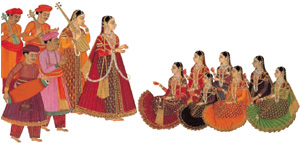
Courtesans skilled in the art of dancing can easily find followers.
A courtesan requested by a friend, or impelled by compassion to have intercourse with a learned Brahmin, a religious student, a devotee, or an ascetic who have all fallen in love with her, and are besotted enough to threaten suicide, suffers an uncertainty about the gain and loss of religious merit.

The couple is engage in a variation of the suspended congress, where the bejeweled enchantress knots her legs in a posture, which would require yogic expertise.
If a courtesan relies solely upon hearsay and rumor about a man, and goes to him without ascertaining for herself whether he has good or bad qualities, and the likely result, this is a mixed doubt about the gain and loss of pleasure.
Auddalika has described the gains and losses on both sides in a concise manner: if a courtesan, living with a lover, gets both wealth and pleasure from him, it is a gain on both sides.
When a courtesan lives with a lover at her own expense without any profit, and the lover even takes back what he has given her earlier, it is a loss on both sides.
When a courtesan is uncertain of a new acquaintance becoming attached to her, and whether he would give her anything, it is a doubt on both sides about gains.
If a courtesan is uncertain whether a former enemy, befriended again at her own expense, would cause her harm because of his grudge against her; or angrily take away anything previously given to her, this is a doubt on both sides about loss.
Babhravya has described the gain and loss on both sides thus: when a courtesan can get money from a man whom she may go to see, and money from a man whom she may not go to see, this is a gain on both sides.
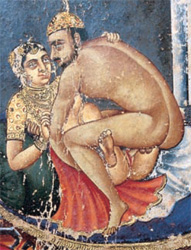
This painting from South India depicts a couple in a sensuous and fleshy display of their sexual talents.
When a courtesan has to incur further expense if she goes to see a man, but runs the risk of incurring an irremediable loss if she does not, this is a loss on both sides.
Where a courtesan is uncertain about a particular man giving her anything if she visits him, without incurring any expense, or whether by neglecting him, another man would give her something, this is a doubt on both sides about gain.
When a courtesan is uncertain whether, on visiting an old enemy at her own expense, he would take back what he had given her, or if by not going he would cause her harm, this is a doubt on both sides about loss.
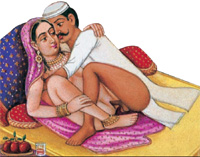
When a courtesan consorts with men she should make them give her money as well as pleasure.
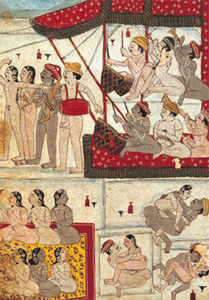
During long lasting wars, soldiers on duty and fighting for their kingdoms, away from their homes often took along a battery of courtesans for pleasure and entertainment.
Forming New Combinations
Having considered this and taken the counsel of her friends, a courtesan should act with the objective of acquiring wealth and warding off disaster. Religious merit and pleasure should also be formed into separate combinations like those of wealth, and then regrouped with each other to make new combinations.
When a courtesan consorts with men she should make them give her money as well as pleasure. On special occasions, such as the Spring Festival, her mother should announce to the various men that her daughter will spend a certain day with the man who would gratify a particular desire of hers.
When young men approach her with delight, she should think of what she may accomplish through them.
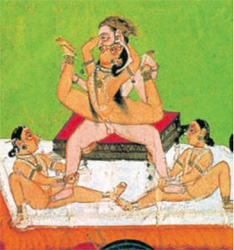
The extraordinarily flexible torso of the seductress allows for an almost impossible posture. The posture requires great strength and suppleness in the participants' bodies.
A courtesan should also consider doubts about gain and loss with reference to wealth, religious merit, and pleasure.
The different kinds of prostitute are: kulata and swairini, secret and open adulteress, kumbha-dasi, a common whore, paricharika, female attendant, nati, an actress or dancing girl, shilpa-karika, an artisan, prakasha, deserter-wife, rupajiva, one with a beautiful body, and ganika, a courtesan.
All these prostitutes are acquainted with various kinds of men, and should consider ways of getting money from them, pleasing them, separating from them, and re-uniting. They should also consider particular gains and losses, attendant gains and losses, and doubts in accordance with their own conditions.
Two shlokas on the subject state:
Men want pleasure, while women want money, and therefore this part, which treats of the means of gaining wealth, should be studied.
There are some women who seek for love, and there are others who seek for money; for the former the ways of love are told in previous portions of this work, while the ways of getting money, as practiced by courtesans, are described in this part.
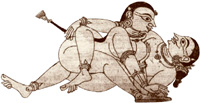
Two gracefully entangled and excited lovers display the woman on top posture.
